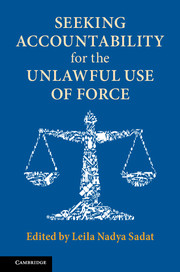Book contents
- Frontmatter
- Dedication
- Contents
- Notes on Contributors
- Foreword
- Preface
- Table of Cases
- Introduction
- PART I HISTORIC AND CONTEMPORARY PERSPECTIVES ON THE UNLAWFUL USE OF FORCE
- 1 The Status of Aggression in International Law from Versailles to Kampala – and What the Future Might Hold
- 2 Nuremberg and Aggressive War
- 3 The Tokyo International Military Tribunal and Crimes Against Peace (Aggression): Is There Anything to Learn?
- 4 The Just War in Ancient Legal Thought
- 5 Definitions of Aggression as Harbingers of International Change
- 6 International Humanitarian Law in an Age of Extremes: Unlawful Uses of Force by Non-State Actors
- PART II MECHANISMS FOR RESTRAINING THE UNLAWFUL USE OF FORCE AND ENHANCING ACCOUNTABILITY
- PART III THE ILLEGAL USE OF FORCE AND THE PROSECUTION OF INTERNATIONAL CRIMES
- PART IV IMAGINING A BETTER WORLD
- Epilogue
- Index
4 - The Just War in Ancient Legal Thought
from PART I - HISTORIC AND CONTEMPORARY PERSPECTIVES ON THE UNLAWFUL USE OF FORCE
Published online by Cambridge University Press: 21 May 2018
- Frontmatter
- Dedication
- Contents
- Notes on Contributors
- Foreword
- Preface
- Table of Cases
- Introduction
- PART I HISTORIC AND CONTEMPORARY PERSPECTIVES ON THE UNLAWFUL USE OF FORCE
- 1 The Status of Aggression in International Law from Versailles to Kampala – and What the Future Might Hold
- 2 Nuremberg and Aggressive War
- 3 The Tokyo International Military Tribunal and Crimes Against Peace (Aggression): Is There Anything to Learn?
- 4 The Just War in Ancient Legal Thought
- 5 Definitions of Aggression as Harbingers of International Change
- 6 International Humanitarian Law in an Age of Extremes: Unlawful Uses of Force by Non-State Actors
- PART II MECHANISMS FOR RESTRAINING THE UNLAWFUL USE OF FORCE AND ENHANCING ACCOUNTABILITY
- PART III THE ILLEGAL USE OF FORCE AND THE PROSECUTION OF INTERNATIONAL CRIMES
- PART IV IMAGINING A BETTER WORLD
- Epilogue
- Index
Summary
INTRODUCTION
In the four-thousand-year recorded history of legal thought, one of the most enduring questions has been, when is it just to engage in war? The discussion of whether a State could go to war for reasons other than self-defense is as old as recorded history. The answers to this question have been varied and fascinating and include opportunity, necessity, vengeance (and punishment). Over the centuries, the most commonly recognized just war is a war of national defense, although even in ancient times wars of humanitarian intervention were recognized as just.
There is an especially interesting perspective on the justness of war that we can find in ancient legal texts, especially from Mesopotamia and the ancient Near East, although I will also refer to texts from ancient China and Egypt as well. And despite what many may think, the perspective on war that is found in these ancient legal texts can provide clear guidance today, despite the differences between the time of Hammurabi, around 1750 BCE, and now. In particular, we will find that the dominant perspective of humanitarianism of many ancient rulers manifested itself in a strong concern for achieving peace, and a peace that involved minimizing oppression. And the emphasis on eliminating or minimizing oppression can give us a model for understanding how wars for national defense or for rescuing those who are oppressed can be justified.
Because there were many wars occurring in these very ancient times, one of the puzzles then, as well as now, is how to reconcile humanitarian motivations with the waging of war. The just war of the ancient Near East, I will argue, involved war that was aimed at pacification. But the peace that just war aimed at was one that diminished oppression in the target States. And so we have the idea that later emerged in humanitarian intervention wars, although these ancient just wars were inspired by a stronger sense of humanitarianism than is often seen today.
In the first half of this Chapter I will look at some of the most interesting ancient responses to the question, when is war just?
- Type
- Chapter
- Information
- Seeking Accountability for the Unlawful Use of Force , pp. 103 - 121Publisher: Cambridge University PressPrint publication year: 2018

